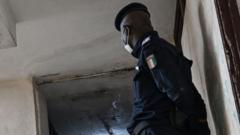The Ivorian government has taken a decisive stance against violence and misconduct within the student community by announcing the closure of all student unions in the country. This decision follows the murder of two students, Khalifa Diomandé and Zigui Mars Aubin Déagoué, incidents linked to members of the powerful Student and School Federation (FESCI), a group that has increasingly been under scrutiny for its activities.
Authorities reported that several FESCI members were arrested in connection with these murders, which occurred in August and September. Additionally, during investigations at Félix-Houphouët-Boigny University in Abidjan, police uncovered an underground tunnel believed to have been used for torture and a brothel. Students have long claimed that FESCI operated these venues, indicating a culture of fear that silenced many.
One former student recounted her harrowing experience: "I was threatened by Fesci many times, they tried to rape me. My boyfriend tried to stand up for me, and he was beaten up." This student, who chose to remain anonymous, expressed relief for the victims in the wake of these events, emphasizing that many others underwent similar trauma.
Extortion by FESCI members has been a reoccurring issue. Jose Aristide, another student, highlighted the financial burdens imposed on students: "I was supposed to pay $100 per month for my room, but they were forcing me to pay $250 per month. There was no other option; everyone feared them."
In a coordinated response, the Security Council of Ivory Coast executed several raids on universities, confiscating over 100 machetes and grenades. Furthermore, approximately 5,000 undeclared residents were expelled from campuses, signaling a significant crackdown on FESCI's influence.
Reactions to the government's ban on student unions have varied. Some welcomed the decision, with one lecturer expressing hope that it would lead to a more peaceful campus environment. FESCI, established in the 1990s, has morphed from a student advocacy group into a formidable entity accused of organized crime and political maneuvering, with former leaders like Guillaume Soro and Charles Blé Goudé having pursued significant political careers.
While the crackdown marks a pivotal moment for student governance in Ivory Coast, it raises questions about the broader implications for student rights and activism in a country still grappling with its violent past.
For ongoing updates, follow our coverage of developments in Ivory Coast and beyond.


















